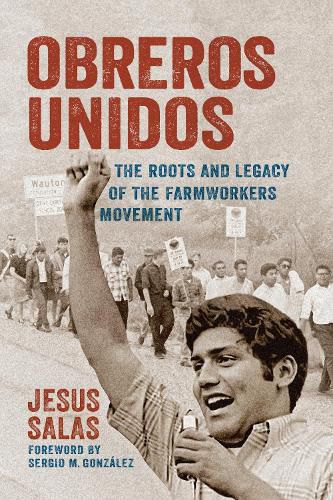Readings Newsletter
Become a Readings Member to make your shopping experience even easier.
Sign in or sign up for free!
You’re not far away from qualifying for FREE standard shipping within Australia
You’ve qualified for FREE standard shipping within Australia
The cart is loading…






In an expansive narrative, noted labor leader Jesus Salas shares an insider's look at the farm workers movement, from its roots in southern political uprisings to its lasting legacy of activism. During his childhood, Salas and his family joined the migrant workers who traveled from their hometown in Texas to work on farms in Wisconsin, Illinois, and other states. In riveting detail, he describes the brutal working conditions and overcrowded labor camps experienced by the Mexican American workers who fueled the Midwest's agriculture industry. Taking inspiration from Cesar Chavez, as a young man Salas and others led a historic march from Wautoma to Madison to demand that lawmakers address rampant violations of Wisconsin's minimum wage laws and housing codes. These young labor leaders founded Obreros Unidos--Workers United--to continue the fight for fairness and respect, as well as to provide much-needed services to migrant families. This memoir of a movement details how their work went beyond the fields to have lasting impacts on representation in community organizations and access to education, empowering later generations to demand better.
Winner of the 2024 Benjamin Franklin Award for Multicultural Books
Winner of the 2024 Hamlin Garland Prize in Popular History from the Midwest History Association
"In recounting the story of Tejano settlement and struggle in Wisconsin, Salas unsettles this story line and, in the process, demonstrates the power of personal narrative and the lasting political implications of retrieving and restoring Latino history." --Sergio M. Gonzalez, author of Mexicans in Wisconsin
"Salas's story is an essential chapter in the history of Wisconsin and Milwaukee and mirrors the growth, progress and dreams of the Latinx community. His reflections speak to not only the importance of the Latinx community, but the need to build alliances across lines of race and gender and fulfill the promise of a multiracial democracy." --Barbara Miner, Milwaukee Magazine
$9.00 standard shipping within Australia
FREE standard shipping within Australia for orders over $100.00
Express & International shipping calculated at checkout
In an expansive narrative, noted labor leader Jesus Salas shares an insider's look at the farm workers movement, from its roots in southern political uprisings to its lasting legacy of activism. During his childhood, Salas and his family joined the migrant workers who traveled from their hometown in Texas to work on farms in Wisconsin, Illinois, and other states. In riveting detail, he describes the brutal working conditions and overcrowded labor camps experienced by the Mexican American workers who fueled the Midwest's agriculture industry. Taking inspiration from Cesar Chavez, as a young man Salas and others led a historic march from Wautoma to Madison to demand that lawmakers address rampant violations of Wisconsin's minimum wage laws and housing codes. These young labor leaders founded Obreros Unidos--Workers United--to continue the fight for fairness and respect, as well as to provide much-needed services to migrant families. This memoir of a movement details how their work went beyond the fields to have lasting impacts on representation in community organizations and access to education, empowering later generations to demand better.
Winner of the 2024 Benjamin Franklin Award for Multicultural Books
Winner of the 2024 Hamlin Garland Prize in Popular History from the Midwest History Association
"In recounting the story of Tejano settlement and struggle in Wisconsin, Salas unsettles this story line and, in the process, demonstrates the power of personal narrative and the lasting political implications of retrieving and restoring Latino history." --Sergio M. Gonzalez, author of Mexicans in Wisconsin
"Salas's story is an essential chapter in the history of Wisconsin and Milwaukee and mirrors the growth, progress and dreams of the Latinx community. His reflections speak to not only the importance of the Latinx community, but the need to build alliances across lines of race and gender and fulfill the promise of a multiracial democracy." --Barbara Miner, Milwaukee Magazine